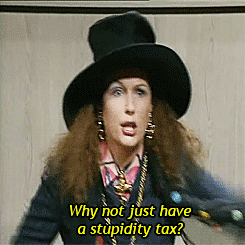
Posted on 11/15/2022 6:00:56 AM PST by AbolishCSEU
Almost a week after the midterm elections, San Francisco's Proposition M, a vacancy tax on landlords, is projected to pass. The San Francisco Chronicle called the race Monday afternoon. (SFGATE and the San Francisco Chronicle are owned by Hearst but operate independently of one another.)
The ballot measure is a warning shot at landlords who are sitting on multiple vacant units, but it includes some notable carve-outs that critics say will blunt its impact. Starting on Jan. 1, 2024, property owners with at least three units that have been vacant for more than 182 days (six months) will be taxed between $2,500 and $5,000 per empty unit. In ensuing years, that penalty will increase to as much as $20,000 per empty unit. The penalty money collected will go to a housing activation fund, which will subsidize affordable housing, including for individuals over the age of 60 in the city.
Single-family homes are exempt from the vacancy tax, as are landlords with only two empty units. Out of roughly 40,000 empty units in the city, the San Francisco Controller's Office estimates that 4,000 units are likely to qualify for the vacancy tax. One of the leading proponents of Prop. M, District 5 Supervisor Dean Preston, lauded its passage.
(Excerpt) Read more at sfgate.com ...
Property owners will just form a "trade" of sorts with leases filled out with each other for a nominal annual fee. I live in upstate NY and it EASILY takes me 2 months to find a tenant who isn't a complete bum/criminal.
This is a ticking time bomb that will destroy the housing market..................
I suspect a lot of these units are upper end rentals where just lowing the monthly rents threatens breaking even with current inflation rates. As well as the target market being fairly tight to start with.
Property owners do not own their property, it seems.

Next step will be to force landlords to rent to any derelict that the state wants housed. The rent will be what the state mandates. Good luck collecting.
Vacancy tax…..
So the landlines can write off no rent as a business loss and then the tax on tip of that.
He/she won’t be paying any taxes. Everything will be written off.
I think they’ve done that in several areas...Portlandia and LA come to mind. Also some places in NY.
They’ll configure the local tax return not to be able to use the “vacancy tax” as a write off.
This is a joke…. A place with some of the most insane rents in the country just made sure rents will go up even more next year…. Idiots.
Everything will be written off
And the owners equity will still be going up $10,000 a month.
Fine. Pull out every cent of equity and then turn every unit into Section 8. Live off the very same government parasites and, in turn, destroy every neighborhood.
Miss IT hipster voted for it. Fine. Welcome your new Section 8 neighbors from some 3rd world country. And they can’t complain about them because they’d be immigrant-phobic
Sword cuts both ways.
Los Angeles is considering doing just that, except with hotels.
I notice that they carved out Single Family Dwellings
You have to have serious money to afford to live in a single family unit in The City By the Gay.
They know Progressive voters won’t tolerate the dirty people living next door to them.

>>Property owners will just form a “trade” of sorts with leases filled out with each other for a nominal annual fee.
Exactly, a one-day lease with a trusted legal entity on a vacant property every 5 months easily gets around this law.
Exactly.
If they do that, then imagine a trusted individual that moves from apartment to apartment, renting them for a couple of weeks or one month, leaving it clean after the rental. Over a year the individual can cause one or two dozen apartments to be rented and therefore be exempt from such a tax. In exchange, the rent could be reduced.
Disclaimer: Opinions posted on Free Republic are those of the individual posters and do not necessarily represent the opinion of Free Republic or its management. All materials posted herein are protected by copyright law and the exemption for fair use of copyrighted works.